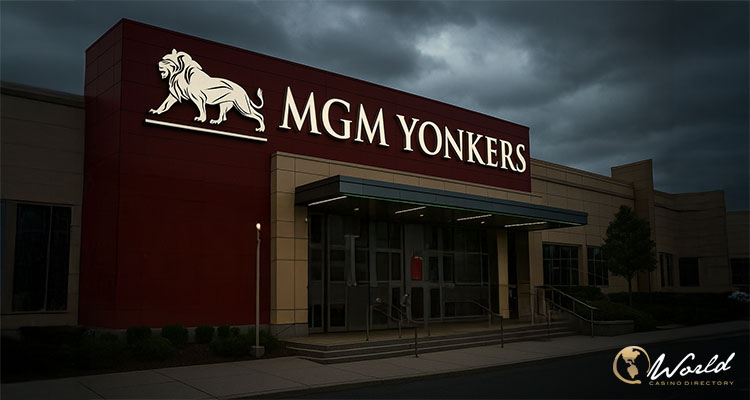MGM Resorts International has unexpectedly withdrawn from New York’s closely watched competition to secure one of the state’s new downstate casino licenses, a move that dramatically reshapes the race and leaves just three contenders vying for as many available licenses.
The announcement, made Tuesday, marks a stunning reversal for MGM Yonkers Inc., which had been widely viewed as a strong favorite to earn approval for a full-scale casino at its existing Empire City property. The company said its decision followed major changes in the economic outlook and regulatory guidance since it first submitted its application in June.
MGM Cites Shifting Conditions and Shortened License Terms
In a formal statement, MGM said, “Since submitting our application in June, the competitive and economic assumptions underpinning our application have shifted, altering our return expectations on the proposed $2.3 billion investment.” The company emphasized that recent developments—particularly an increasingly crowded market near New York City—had upended its projections.
“The newly defined competitive landscape – with four proposals clustered in a small geographic area – challenges the returns we initially anticipated from this project,” the statement continued. MGM also pointed to a key regulatory change: new state guidance suggesting that its proposal would qualify for only a 15-year casino license instead of the 30-year term it had anticipated.
The shorter term, MGM said, no longer aligned with its financial strategy or that of its real estate partner, VICI. Despite the withdrawal, the company pledged to continue operating Empire City Casino in its current form. Since acquiring the Yonkers site in 2019, MGM noted, the property has contributed more than $5 billion to New York’s education funding, including $1.6 billion since MGM took ownership.
Yonkers Officials Denounce Decision, Demand Investigation
The withdrawal provoked swift backlash from Yonkers leaders, who had supported the expansion as a major local economic opportunity. Mayor Mike Spano blasted MGM’s move as “nothing short of a betrayal to the people of Yonkers and Westchester County.”
Spano accused the company of abandoning the city after years of preparation and called on Governor Kathy Hochul to “launch an independent investigation into this process, because the reasons MGM gives for its 180-degree reversal just don’t add up.”
He further suggested potential conflicts of interest, arguing that the biggest beneficiary of MGM’s exit could be Bally’s, which is pursuing a casino project at the former Trump golf course in the Bronx. The mayor noted Bally’s agreement to pay an additional $115 million to the Trump Organization if its casino bid succeeds, saying, “People need to be assured that there is no linkage between MGM’s decision and the massive financial benefit to Donald Trump.”
Westchester County Executive Ken Jenkins echoed Spano’s frustration, calling the move “shocking” and “deeply dismaying.” He questioned why MGM would abruptly withdraw after receiving community approval and advancing through the first round of the state’s review process.
Three Casino Proposals Still in Play
MGM’s decision narrows the field to three active contenders for New York’s coveted downstate casino licenses, expected to be awarded by year’s end. The remaining proposals are:
- Resorts World New York City, operated by Genting Group, which hopes to expand its existing Queens facility into a full-scale casino.
- Bally’s Bronx, proposing a $4 billion project on the former Trump Links golf course, with its $115 million payout clause for the Trump Organization.
- Metropolitan Park in Queens, a proposed $8 billion complex led by New York Mets owner Steve Cohen in partnership with Hard Rock International.
Each proposal faces its own community and regulatory hurdles, and state officials have stressed that the Gaming Commission is not required to award all three licenses. “It could be zero, one, two or three licenses that are issued in this process,” said Lee Park, a commission spokesman, according to The New York Times.
A Major Setback for MGM’s New York Ambitions
MGM’s Empire City project had been among the most advanced in the race, having secured unanimous approval from its Community Advisory Council in late September. The company had planned a $2.3 billion expansion featuring more than 180 live dealer tables, 14 new dining and entertainment venues, and a 5,000-seat concert arena.
Bennett Liebman, a government lawyer in residence at Albany Law School, described the withdrawal as “astonishing,” given how close the state is to making its final selections. “If they had gotten out early, I might understand this,” he said. “But having waited until the middle of October, it’s just mind-boggling.”
For now, MGM’s Empire City Casino will continue to operate its electronic gaming machines and racetrack, though its ambitions for full-scale casino gaming have been shelved indefinitely. As the state inches toward awarding licenses, New York’s once-crowded casino race has suddenly narrowed—leaving questions, controversy, and competing interests in its wake.


